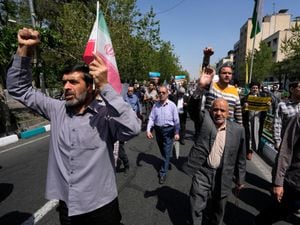Yemen conditions ‘catastrophic’, says UN humanitarian chief
Mark Lowcock warned the Security Council that ‘famine remains a real threat’.

The UN humanitarian chief has warned that conditions in Yemen are “catastrophic” after three years of war, with a record 22.2 million people needing aid and protection.
Undersecretary-general for humanitarian affairs Mark Lowcock warned the Security Council that conflict in Yemen has escalated since November, leaving more people hungry.
“Famine remains a real threat,” he warned.
In a speech read by UN director of humanitarian operations John Ging, Mr Lowcock said that 8.4 million Yemenis “are severely food insecure” and about 400,000 children under the age of five “are so severely malnourished they are 10 times likelier to die without treatment than their healthy peers”.
Special UN envoy to Yemen, Ismail Ould Cheikh Ahmed, said the two sides had been on the verge of a peace agreement during negotiations in 2016, but the parties refused to sign at the last minute.
He told the council it became clear that the Houthi rebels were not prepared to make concessions on security arrangements.
“This has been a major stumbling block towards reaching a negotiated solution,” he said.
Mr Cheikh Ahmed called on the parties “to cease hostilities, reactivate negotiations aimed at a peaceful settlement” and “to make the culture of coexistence prevail over the language of war”.
His successor is former British diplomat Martin Griffiths, currently executive director of the European Institute of Peace.
Yemen, with a population of 26 million, plunged into war in 2014 after the Houthis took over the capital Sanaa and forced the internationally recognised government to flee and seek support from neighbouring Gulf countries.
In March 2015, a Saudi-led, US-backed coalition began what has turned into a devastating war that has killed more than 10,000 people and displaced 2 million. Saudi Arabia views the Houthis as an Iranian proxy.
Mr Cheikh Ahmed called Yemen “the world’s largest man-made humanitarian crisis,” as well as an economic crisis that has seen the economy shrink by almost 40% since 2015 and the value of the Yemeni riyal drop by more than 50% in 2017.
Mr Lowcock said that 1.25 million public employees and their families — representing a quarter of the population — have not received regular salaries since August 2016. This has accelerated the decline in public services as health workers and teachers seek alternative work, he said.
Mr Cheikh Ahmed said “it has become clear that revenues that should be contributing to salary payments, maintaining basic services and stimulating the economy are instead being used to fund the war”.
“Moreover, informal taxation and other forms of corruption are flourishing, exacerbating the humanitarian situation,” he said.
Mr Cheikh Ahmed also expressed serious concern at reports from several humanitarian organisations that thousands of child soldiers are being recruited by all parties to the conflict. He warned that “the systematic recruitment of children by the Houthis may have negative implications on the future of the country”.
The Security Council met a day after Russia vetoed a British-drafted resolution that took aim at Iran over a report by UN experts that said the country violated an arms embargo by failing to prevent missiles and drones from being supplied to Shiite rebels in Yemen.





